There are many words that have been used to describe Dianne Whelan. Filmmaker. Photographer. Author. Artist. Adventurer. Explorer.
I’d like to add another two words: Personal Hero.
Whelan is an award-winning Canadian indie film producer and director, best known for two of her previous documentaries: “This Land” which recounts a 2000 km expedition that Whelan undertook with a unit of seven Canadian army rangers to raise a flag on the northernmost tip of Canadian soil – and “40 Days at Base Camp”, in which she settled into life at Mt. Everest’s base camp (18,000 ft. above sea level) to film the stories of three climbing teams and their journeys up to the peak. Whelan also wrote two books about her adventures, published by Caitlin Press: This Vanishing Land: A Woman’s Journey to the Canadian Arctic and Base Camp: 40 Days on Everest.
Whelan exhibits attributes that many of us long for – perseverance, courage and abundant resourcefulness, especially in arduous and, let’s face it, crazy situations. She likes to remind us what an amazing world we live in, and introduce us to some of the amazing people in it. I think why many folks also recognize Whelan as a great storyteller is that she isn’t afraid to show her vulnerable side.
In her latest project, Whelan is tackling a solo pilgrimage along the entire route of The Great Trail (also known as the TransCanada Trail). The Great Trail, which officially opened on July 1, 2017, is the longest trail in the world, stretching over 24,000 km (7,000 of it by water) while linking 15,000 Canadian communities and the Atlantic, Arctic and Pacific Oceans.
Whelan has been hiking, biking, paddling and snowshoeing along the trail since Canada Day of 2015. At the time she began, many parts of the trail were incomplete or under construction. She set out from Newfoundland and headed west – and has been filming the whole journey for a feature documentary (with the help of co-producer Ann Verill and other friends who periodically meet up with Whelan on the trail.) Along the way, Whelan has been updating her website 500daysinthewild.com with short videos and blog posts.
The Great Trail (500 DAYS IN THE WILD) 1:49:
Whelan’s initial plan was to complete the trek by July 1, 2017, the official opening of the trail, and Canada’s 150th birthday. It is now, of course, a little over a year past that date. Whelan estimates it might take her another two years to finish the trek, but she’s given up the idea of making predictions.
We caught up with Whelan at a café in Atikokan, Ontario, about to embark on a section of The Great Trail called “Path of the Paddle”. It’s a 1200 km canoe route, with 200 portages, that meanders from Thunder Bay to Kenora in northwestern Ontario.
She explained that her westward progress in hiking The Great Trail puts her now nearing the Saskatchewan border – but last winter she got frozen out of the “Path of the Paddle” section. She was about half way through, when one morning she woke up to discover that the water had turned to ice.
“I ended up portaging my canoe out of the forest,” recalls Whelan, “and then I picked up the land trail in Manitoba and hiked for the rest of the winter. I knew that I would come back to finish Path of the Paddle before I went into Saskatchewan. So here I am, about to give Path of the Paddle a second try!”
Whelan figures she will be “off grid” on this remote section of the Trail for about a month. Then she’ll pick up the Trail at the border to Saskatchewan, and continue hiking until she reaches Edmonton.
“Once I hit Edmonton, I have another 3000 km paddle up to the Arctic Ocean,” explains Whelan. “Then I hike all the way back down into Alberta and then through B.C. The end of the Trail for me will be Mile Zero in Victoria, B.C. I’m not exactly sure when I’ll get there.”
Part of the learning curve on this journey for Whelan has been surrendering her plans.
“I’ve discovered that what keeps me safe out here is not being rigid to some sort of schedule,” she says. “I have to honour the fact the weather is what the weather is, and it’s always more prudent to sit and wait for a storm to pass than to plunge ahead. I’m not out here to prove how strong I am, and I’m not in any kind of race. I’m an artist, seeking understanding.”
We asked Whelan how this project began. A few years ago, nearing her 50th birthday, she experienced what she calls a “crisis of the human spirit”. The world stopped making sense. She couldn’t stop thinking about the ecological destruction in the world, and with it the rise of anxiety and depression in so many people.
“I started wondering if maybe everything we needed to know, we had forgotten,” says Whelan. “So my idea was to embark on the longest trail in the world, and search for some of that lost wisdom.”
Whelan was born in B.C., but has lived in many places across Canada. With her Newfoundland and Acadian ancestry and her Mi’kmaq great-great-grandparents, her journey is about building new bridges between cultures. It’s also about learning to be mindful as she travels, open to discovering new things.
We asked about some of her most memorable lessons so far on the trek.
“There have been quite a few, and most of them have come the hard way,” laughs Whelan. “For instance, when I began, I brought way too much gear. It was not a pretty start. Another lesson comes to mind that happened when I was canoeing across Bras d’Or Lake on Cape Breton Island in Nova Scotia. Bras d’Or is called “Canada’s inland sea” because it’s a mixture of salt water and fresh water. It’s huge – 450 square miles. As I reached it, I met with some Mi’kmaq friends who had a small ceremony for me as I started, and gifted me with a paddle. One Day 11, I got in some serious trouble, and in fact I thought I might die, but the wind blew me ashore. I happened to see this beautiful ruby-red rock on the shoreline, and I decided to take it with me.”
Whelan got back in her canoe and paddled out on the lake. The winds started up again, and she was swept into open water. Whelan recalls that “the fear of death “ was in her throat, but all she could think about was that red rock in her pocket. She remembers shouting at the wind and waves, “If I reach the shore, I promise I’ll give you back the rock!”
Somehow Whelan managed to make it back to shallow waters, and immediately threw the rock back on the shore.
“I realized that’s where it belonged,” explains Whelan. “And that was another lesson for me – that I needed a different definition of the word ‘explorer’. As an explorer, I’m here to learn and listen; not to take things, as explorers did in the past. I finally made it across the lake, after 40 days of paddling. And I was met by Grand Chief Ben Sylliboy and other Mi’kmaq elders, who gifted me with a feather. I felt so honoured by that.”
Another story and another lesson: this time when Whelan got very lost in the woods of Nova Scotia, and a storm hit.
“I was pretty scared. My cell phone was dead, my map had crumbled to pieces in the rain, and the storm was getting worse,” explains Whelan. “Suddenly I saw a car and two hunters, dressed in full camo, with guns and rum and cigars. Instead of being glad to see them, I was afraid. But they were very concerned about me and insisted I drive back with them to their hunters’ cabin to dry out. I was still afraid, but I had to trust them. Well, we drove to the cabin, and they made a big fire, and fed me deer meat, and basically just took care of me. By the end of the evening we were friends, and I even smoked one of their cigars. The next day it cleared up and they took me back to the trail. So that was another lesson for me – when we look at the world from a perspective of fear, then everything we see and hear comes from that place. I think a big part of the problem is that too often the media today fuels our fears.”
Whelan has refused to take part in any corporate sponsorship for her trek. She has relied on donations to her website, 100% of which goes toward the film project. She has also been overwhelmed by the outpouring of support and encouragement she has received from individuals, families and business owners wherever she travels.
One thing Whelan has committed to doing is to start every morning on the trail by burning sage and praying for the Indigenous women who have been murdered or remain missing in Canada.
“On a personal level, this trip is about reconciliation,” says Whelan. “Holding space and praying for these women is one way of doing that. It’s really helped shape my journey. I know now that it’s not how you travel – it’s what you carry within your heart that’s important.”
In her cross-country trek, Whelan has gained a more expansive frame of reference for life, which she is eager to share with others. In our conversation, it’s clear that she has come to understand that we are here as a result of the continuum of life, which confirms the importance of honouring the ancestors of this land, and also making sure that we make our decisions with regard to those who will come after us.
“Indigenous elders always think about the impact of their actions on seven generations into the future,” says Whelan. “Those are the people who are my heroes, the people who aren’t just thinking of themselves. After these last three years on The Great Trail, my spirit is feeling stronger and clearer… I’ve received so much, but I’m excited because I know there’s still a lot to learn.”
You can learn more about Dianne Whelan’s journey on The Great Trail by visiting her website 500 Days in the Wild or following her on Facebook
Photos and video courtesy of Dianne Whelan


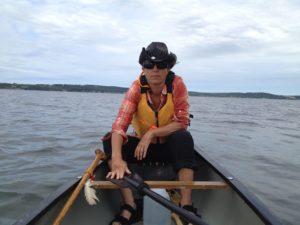
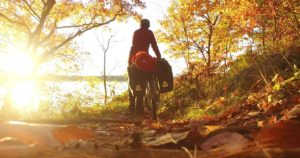
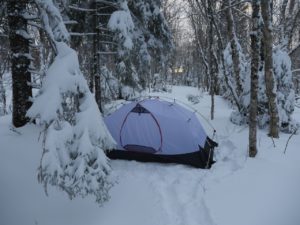
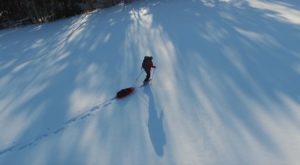
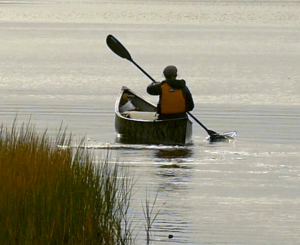
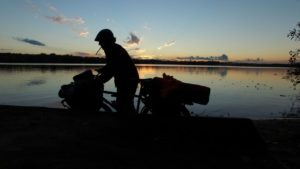






I can somewhat relate to Dianne observation about what connects us as Canadians, its this great land of ours.
I just returned from 17,000 KLM motorcycle trip across this great country leaving Lunenburg NS June 1 ending up in Tofino BC and back home July 25.
I think your journey is most inspiring and wish you Gods speed and protection
Will be following you
I can somewhat relate to Dianne observation about what connects us as Canadians, its this great land of ours.
I just returned from 17,000 KLM motorcycle trip across this country leaving Lunenburg NS June 1 ending up in Tofino BC and back home July 25.
I think your journey is most inspiring and wish you Gods speed and protection
Will be following you
Wow, Derryl, that sounds like an amazing trip! You must have experienced and seen and learned so much. Good for you!
Thanks Daryl. Shine on